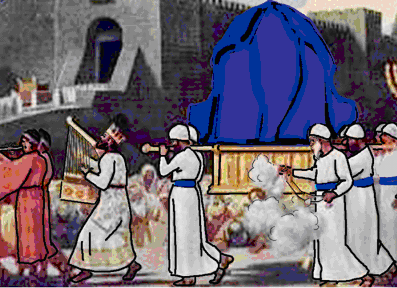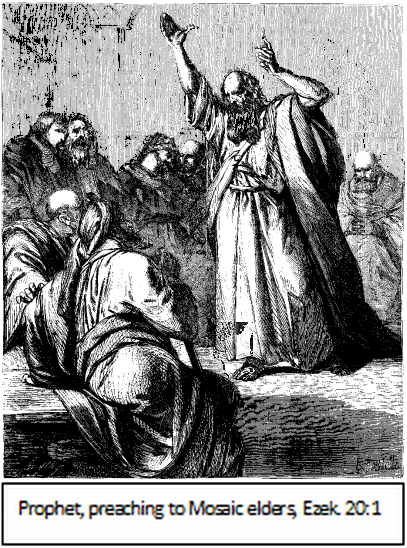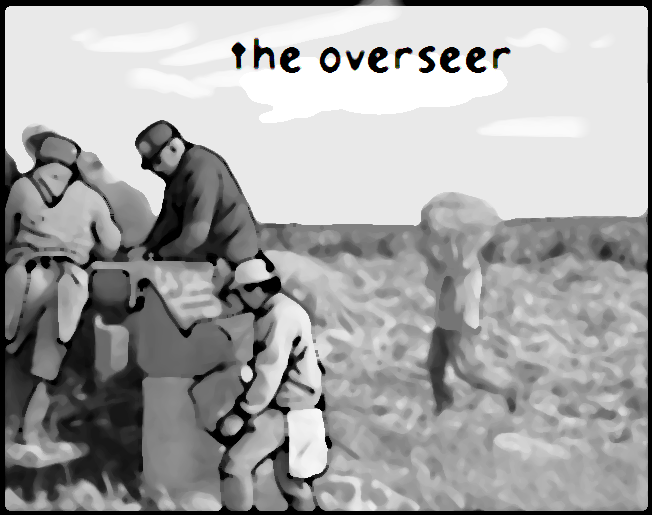|
CHAPTER 1 “GIFTS AND METAPHORS” Gaylon West
"Then David said, 'No one may carry the ark of God but the Levites, for the LORD has chosen them to carry the ark of God and to minister before Him forever.'" (1 Chronicles 15:2) GOD'S GIFTS FOR RELIGIOUS SERVICE IN THE OLD TESTAMENT" Behold, I Myself have taken your brethren the Levites from among the children of Israel; they are a gift to you, given by the Lord, to do the work of the tabernacle of meeting. 7 Therefore you and your sons with you shall attend to your priesthood for everything at the altar and behind the veil; and you shall serve. I give your priesthood to you as a gift for service, but the outsider who comes near shall be put to death.”" (Numbers 18:6, 7, NKJV). LEVITES WERE GIFTS FROM GODThe tribe of Levi did not have a separate inheritance in the land of Canaan along with their brethren, the children of Israel. They lived and served among the various tribes. A particular family of Levi, Aaron's, served as priests in the tabernacle.i The tribes supported the tribe of Levi with tithes because they belonged to the Lord in His service. The tribe of Levi in turn was to support the priests with their tithes and their labor in the assigned religious work. They were the Lord’s gift to the priests. The work of the priesthood was God's gift to Aaron's children for service. The Levites served and assisted the priests who in their role accepted and performed the sacrifices of the people to God. The Levites were God's gift to Aaron's children. The work of the priests itself was God's gift to Aaron. Being a gift from God meant that their role must be governed by God's authority, His Word. "They shall attend to your needs and all the needs of the tabernacle; but they shall not come near the articles of the sanctuary and the altar, lest they die-they and you also" (Numbers 18:3). If they varied from God's instructions, the offenders would die. Being God's gifts was an awesome and fearful duty. It was a matter of life or death. NEW TESTAMENT GIFTS OF SERVANTS“ Therefore He says: "When He ascended on high, He led captivity captive, And gave gifts to men." And He Himself gave some to be apostles, some prophets, some evangelists, and some pastors and teachers, for the equipping of the saints for the work of ministry, for the edifying of the body of Christ, till we all come to the unity of the faith and of the knowledge of the Son of God, to a perfect man, to the measure of the stature of the fullness of Christ; that we should no longer be children, tossed to and fro and carried about with every wind of doctrine, by the trickery of men, in the cunning craftiness of deceitful plotting, but, speaking the truth in love, may grow up in all things into Him who is the head--Christ-- from whom the whole body, joined and knit together by what every joint supplies, according to the effective working by which every part does its share, causes growth of the body for the edifying of itself in love” (Ephesians 4:7, 8, 11-16, NKJV).
The gifts given by Christ are apostles, prophets, evangelists, pastors and teachers. These gifts were given at His ascension. According to Acts 1 and 2 Jesus (and the Father) sent the Holy Spirit to endow the twelve apostles. As the days, weeks, and months pass, the gifts are expanded through the Spirit to include deacons, evangelists, and elders and teachers. What were the New Testament gifts for? This passage says that Christ’s gifts to men were “for the equipping of the saints, for the work of ministry, for the edifying of the body of Christ”. Are the saints not members of the church (1 Corinthians 14:33)? Just as in the Old Testament, God has given gifts of servants in the New. Since the gifts were for the church, then we can properly conclude that the “apostles, …pastors” were gifts for us who are members of the church to enjoy. Relative to our study of the gifts of God in servants for the church is this passage:
“There are diversities of gifts, but the same Spirit. There are differences of ministries, but the same Lord. And there are diversities of activities, but it is the same God who works all in all. But the manifestation of the Spirit is given to each one for the profit of all: for to one is given the word of wisdom through the Spirit, to another the word of knowledge through the same Spirit, For by one Spirit we were all baptized into one body--whether Jews or Greeks, whether slaves or free--and have all been made to drink into one Spirit. And God has appointed these in the church: first apostles, second prophets, third teachers, after that miracles, then gifts of healings, helps, administrations, varieties of tongues” (1 Corinthians 12:4-8, 13,28 ).
Very important point: all gifts of the Holy Spirit are for the profit of ALL.ii It is not just a gift for the individual vessel that received it. For example, the wisdom from the Spirit was to be given to all. The knowledge from the Spirit was to be given out to others. Like leaven, it was to permeate the loaf (Luke 13:22). Indeed, to selfishly hide it within oneself is kin to the one talent man (Matthew 25:24). All gifts have their respective purposes of ministries and activities, including the gift of helps and administrations (1 Corinthians 12:28).
THE “APOSTLES”, GIFT TO THE CHURCHBEGAN ON PENTECOST, c. 30 A.D.
The apostles had been in training but they were not placed into apostolic service until the Holy Spirit brought power to them on the day of Pentecost following the resurrection of Jesus from the grave.
"Behold, I send the Promise of My Father upon you; but tarry in the city of Jerusalem until you are endued with power from on high" (Luke 24:49).
Although studying with Jesus one- on-one for over three (3) years, they were still not allowed to do apostolic work until the Holy Spirit gave the gift. Jesus ascended and gave gifts. Note: the twelve along with the seventy had preached with miraculous powers confirming their message; but the message was limited in scope and was before the death, burial and resurrection of Jesus and their subsequent commission unto the whole world (Mark 16:14-20).
How were the “apostles” gifts from God? They were qualified by the Lord in their selection, training and direct guidance by the Spirit of God.
Apostles were miraculously endowed on the day of Pentecost (Acts 2). Being endued with power they began carrying out Jesus' commission to go into the whole world and preach the gospel to every creature. Prophets and supernaturally endowed evangelists start in Acts 6 (Stephen, first martyr; Philip, called an evangelist later). We still benefit from the apostles’ and (NT) prophets' doctrine, the Bible. John Mark and Luke the Physician were not apostles but inspired prophets, inspired by God-breathed words, which words are extant today.
“(You are) fellow citizens with the saints, and of the household of God; and are built upon the foundation of the apostles and prophets, Jesus Christ himself being the chief corner stone” (Ephesians 2:19, 20).
Obeying the good news (gospel) preached by the apostles, the converted disciples continued in the “apostles' doctrine” which was given to them from the Holy Spirit (Acts 2). Jesus declared before God and the apostles that that teaching would be God's Word, labeled by Him as Truth. Jesus prayed that all would be unified by being sanctified by that Truth (John 17) delivered through the apostles.
"Sanctify them by Your truth. Your word is truth. As You sent Me into the world, I also have sent them into the world. And for their sakes I sanctify Myself, that they also may be sanctified by the truth. I do not pray for these alone, but also for those who will believe in Me through their [apostles’] word; that they all may be one, as You, Father, are in Me, and I in You; that they also may be one in Us, that the world may believe that You sent Me” (John 17:17-21).
THE GIFT OF “PROPHETS” BEGAN IN ACTS 6The prophetsiii came into service with the laying on of hands by the apostles to the seven (Acts 6). The gift of prophecy is one of the special gifts of the Spirit of Christ (1 Corinthians 13:1-3).
The seven ministers (deacons) “full of faith and the Holy Spirit” began preaching and “did great wonders and signs” [miracles]. They were Spirit directed in their speaking and by definition would be called a prophet. Any resulting writings are said to be inspired (literally, Spirit-given; 2 Timothy 3:16ff). Would not their writings be a gift to us today as well as those of the first century (2 Peter 2:1)?
THE GIFT OF “EVANGELISTS’” BEGAN AFTER THE DISPERSIONOF THE CHRISTIANS FROM JERUSALEM (ACTS 8).
One of these Spirit-endowed seven is called an “evangelist” later (Acts 21:8) after the disciples are dispersed into the Empire. Timothy and Titus are considered evangelists. Timothy is told to do the work of an evangelist (2 Timothy 4:5). His job is described as preaching the Word (verse 2). The gift (or grace) that was through the evangelist was “given thee by prophecy, with the laying on of the hands of the presbytery” (1 Timothy 4:14). The inspired Word was given both through the prophets and with the laying on of Paul's hand (2 Timothy 1:6). Would an uninspired preacher not be a gift of God to churches today if his “words be in agreement with true and right teaching” (Titus 2:1, BBE)? By definition of the word “evangelist” the preacher would be a gift to the church. “How beautiful are the feet of them that preach the gospel of peace, and bring glad tidings of good things!” (Romans 10:15).
THE GIFT OF “PASTORS” TO THE CHURCH FOLLOWED
Initially, like the evangelists, the pastors would have been given extraordinary powers from the laying of hands of the apostles (Acts 8). They did not have a written Testament from Jesus. Rather, Jesus wrote it miraculously by the Spirit upon their hearts (Hebrews 8; 2 Corinthians 3:2; 4:7). The gifts "apostles, prophets and teachers" occur along with lists of miraculous gifts in 1 Corinthians 12:28, but pastors as such are not listed there. However, the Spirit’s gift of “governments” is. “Governments” is the Greek word kubernēsis that means “directorship"iv. The leadership initially then was miraculously aided.
Pastors are to be the Spirit’s gift to the church. Consequently, since the Spirit is sent by Jesus, pastors are also Christ’s gift to the church (as is taught in Ephesians 4). Pastors must feel heartfelt reverence for their responsibility to follow the Spirit’s instructions for the making of pastors. We pastors are to “take up the gauntlet”, not as inspired and miracle workers ourselves, not adding to or perverting the Spirit’s authorized pastors, but following the Holy Scriptures. By doing this we can be just as much the Spirit’s gift to the church as were the miraculous directors of the first century. The difference is that we study for ours (2 Timothy 2:15).
IMPORTANCE OF THE LIVING ORACLES
The Scriptures are called “lively” or living oracles from God (Acts 7:38; Hebrews 5:12; 1 Peter 4:11). The apostles' doctrine is “alive” today in the Bible. The prophets’ teachings, which were to complement the apostles’ teaching, would be living. Their gift is extant for the ministry to mankind today. The evangelists are authorized by the New Testament. As long as uninspired ones preach the written gospel (2 Timothy 4:1-5; Romans 10), they too are gifts from the Spirit that guided the writing. As long as pastors are qualified, appointed, and led by the Spirit (as instructed in His Word), they are Christ's gift to the church today.
METAPHORS OF THE GIFT OF PASTORS
Jesus used metaphors to teach: He was a door and a shepherd (John 10). Herod was a fox (Luke 13-32); etc. In Ephesians 4 pastors are called a gift from Jesus.
PASTORS ARE SHEPHERDS
This word pastors (Greekv “shepherds”) is from a root meaning “to protect”. Jesus said the good shepherd lays down his life for the sheep (John 10:11) and called himself the Good Shepherd. In Hebrews 13:20 Christ is the Great Shepherd (compare to 1 Peter 2:25). But the verb, to shepherd,vi is employed by Jesus to Peter (John 21:16), by Peter to elders (1Peter 5:2), by Paul to the eldersvii of Ephesus (Acts 20:28). In Ephesians 4 Paul groups “pastors and teachers” together.
"Therefore take heed to yourselves and to all the flock, among which the Holy Spirit has made you overseers, to shepherd the church of God which He purchased with His own blood" (Acts 20:28).
This passage translation has the verb “shepherd”. The word “pastor” is the noun form of the verb “shepherd.” There are at least three job designations given for God's leaders in the churches. They refer to the same workers. Paul calls for the elders of the churchviii (Acts 20:17) at Ephesus to meet him in Miletus.
In Acts 20:28, he tells these elders that they are to pastor.ix Elders are made shepherds of the local flock over which God has “entrusted” them and whom they willingly serve.*
PASTORS ARE “ELDERS.”
The term “elder”
as applied to Christian leaders in the churches first appear in Acts
11:30 (in Judea), followed by the mention of Paul appointing them in
every church in Asia Minor (Acts 14:23). The next mention of elders
is in Jerusalem in Acts 15:4, 6, 22 in connection with the
apostles and the church. The tutoring of the Old Testament (Galatians
3:24) had made those that had read Moses aware of the value of the
leadership of elders in the synagogues.
Paul uses two terms (presbuterous, ton episkopon) in Titus 1:5-7 in authorizing the appointment of men to this work. Two terms, one work: “elders” and “bishops.”
PASTORS ARE “BISHOPS”
Paul says that the Holy Spirit had made the elders “bishops”x (Acts 20:28). That is, the elders are made superintendents of the local church. Just as we are born of the Spirit (John 3: 3-5; 1 Cor. 12:13) and made Christians by the Spirit by obeying the Spirit’s instruction to believe and be baptized, they were made bishops; i.e., instructions by the same Spirit.
*It is also written, “Shepherd the flock of God that is among you, exercising oversight, not under compulsion, but willingly, as God would have you; not for shameful gain, but eagerly; not domineering over those in your charge, but being examples to the flock” (1 Peter 5:2, 3, English Standard).
PASTORS ARE “EXAMPLES”
The pastors are to humbly lead but not lord over God’s flock; they are to lead like Jesus by the “model method of teaching.” I read in a college textbook ages ago that the “model method of teaching” can be found almost exclusively in some private religious schools. Not in public schools. The Spirit through Peter thought it was a good method for pastors of the churches.
This reminds us of the Lord’s injunction to the apostles, " But it shall not be so among you: but whosoever will be great among you, let him be your minister" (Matthew 20:26). The apostles and elders were to serve.
Jesus gave a demonstration of this style of leadership by washing His apostles’ feet. He taught them by example. Those in charge of the church are to follow Jesus’ example in serving by modeling, not lording and domineering. PASTORS ARE “ARTISTS”
“For the equipping of the saints”; i.e., “perfecting of the saints” (Ephesians 4:12). Jesus wants us to be “More like Jesus every day.”
(Ephesians 4:12). For the “perfecting”xi of the saints (members of the church). Commentators suggest that this term is only used here in the New Testament. There is a form of the word used for mending the fishing nets during Jesus’ earthly ministry and in 2 Corinthians 13:9. All terms are derived from a wordxii meaning “to mend” (Matthew 4:21; Galatians 6:1). “For the mending (repair) of the saints.”
Our American English has adopted many Greek words to accommodate naming certain items or actions. The Greek word for 'perfecting' happens to be derived from a word from which there is a legitimate claim for our English word "artist” (artios). Fundamentally the Greek word means “complete.” Strong’s Dictionary explains that katartizōxiii is for the pastors to “put in order” and “repair or adjust: - fit, frame, mend, perfect, prepare, restore, equip, furnish.” First, they are “to put in order,” to organize God’s work according to Biblical guidelines. Second, they “restore,” set things right when they are out of sorts and take care of problems. Third, they “furnish, prepare, and equip” by giving believers the tools to do the job that lies ahead.
I perceive a metaphor is appropriate here. Pastors are spiritual "artists" who use the medium, the Word of God, to prepare, mend, and restore every Christian under their care into the image of Jesus Christ. That is, “unto the measure of the stature of the fullness of Christ” (verse 13). The pastors are to paint or sculpture the Christian completely (perfectly) in the likeness of Christ. Elders (pastors) could think of the new creatures in Christ as blank canvases and know that although God is the potter, their responsibility is to be His brush (Romans 9:21). Each one of us begins in this sense as an empty canvas. We are new creatures in Christ (2 Corinthians 5:17). The Holy Spirit's plan is for us to be brushed in the likeness of Jesus on the canvas with the paint of Truth: the apostles' doctrine (John 17:17-21). If a flaw occurs, then go back to the canvas and touch up. The following fundamental truth bears repeating. Jesus' prayer identifies these concepts: Truth is the Word of God; it was to be revealed to and taught by the apostles; it was to be believed and obeyed by every creature who was to be "one" with the apostles' teaching. The idea in the mind of the artist has to be the picture that the Holy Spirit has given. The finished product eventually will bring joy to the elders just as much as a finished painting would to a Picasso. You say, "I want to be a good Christian; help me, Lord". God has sent one form of help in the gift of pastors (elders); i.e., those that use the Bible to build us up. “And now, brethren, I commend you to God, and to the Word of His grace, which is able to build you up” (Acts 20:32).
PASTORS ARE CHRIST’S “DUST RAISERS”
“For
the work of the ministry.” The word "ministry"
is literally "dust raisers in a hurry" and refers to
serving others. Think of the feather duster that is used by a maid.
"All are created unto good works" (Ephesians 2:11). Those
good works are to be in service to others. There is one Lord, one Spirit, but several ministries, for the members to serve all (1 Corinthians 12:5). Jesus came to Earth to serve. He's the Master; He wants His followers to serve the body. Jesus served the apostles; He even washed their feet to humbly illustrate service. Service is from the menial hospitality to waiting on the destitute. The elders are to show us how to serve and guide us into service to Jesus and His church. You say, "I want to be a part of a working church; then cooperate and follow God's gift, the elders". “Work” is ergon, which means the result or object of employment, something to be done. The word “ministry” is the Greek diakonia which speaks of labor and service and originally spoke of serving tables (Acts 6, the seven were chosen to be responsible for the “serving of tables”). Every Christian is ‘employed” to do the works of God (Ephesians 2:11). The elders are called to train God’s people for carrying out the tasks of ministry. As the context clearly shows, all members serve the body
PASTORS ARE CHRIST’S “BUILDING CONTRACTORS”
“For
the edifying of the body of Christ.” "Edifying"
is a metaphor of building a house. Jesus originally used the
metaphor in Matt. 16:18. Paul uses the metaphor in 1 Corinthians
3:10. Jesus can be the only foundation. We are warned how we build
thereon: wood, hay, stubble, OR gold, silver, precious stones? The
elders teach and train so that we can in turn teach others.
Figuratively, we are to reproduce healthy sheep for the Master, if
you please. Peter uses the word "living stones" for the “spiritual house.”xiv Each is a living stone being built into it (1 Peter 2:5). Ephesians 2 states that we are built upon the foundation of the apostles and prophets, Jesus Christ, being the chief corner stone. We are built up as a holy Temple for the Lord. Notice the progression. On the one hand, we have individual Christians being molded into Christ-like people. Then we have them serving one another. And then, we have them reaching out to the alien lost and thereby increasing building blocks for the holy structure. Outreach if you please. You say, "I want to be a part of a growing church; help us, Lord, to grow." God's answer for leadership is the pastors, the elders. Jesus said, “I will build my church” (Matthew 16:18). Yes, we will plant, we will water, but He must give the increase (I Corinthians 3:6-7). We are to preach the Word of Christ, and God will give the increase according to His sovereign will. In other words, Christ has the blueprint and the elders are the contractors.
Pastors must use the blueprint, God’s plan of redemption.
P
|








 ASTORS
ARE CHRIST’S “MASONS”
ASTORS
ARE CHRIST’S “MASONS”
